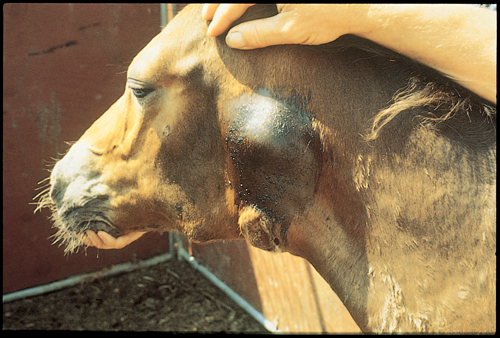Equine Internal Medicine Q&A 06
| This question was provided by Manson Publishing as part of the OVAL Project. See more Equine Internal Medicine questions |
You examine a four-month-old foal with bilateral swelling behind the ramus of the mandible. In the past few weeks a number of the young horses on this large farm have had bilateral purulent nasal discharge, fever and submandibular lymphadenopathy. Only this foal has the large swelling just caudal to the ramus of the mandible.
| Question | Answer | Article | |
| What is the likely diagnosis? | Guttural pouch empyema. |
[[|Link to Article]] | |
| What is the aetiology of this condition? | Guttural pouch empyema is frequently seen following infection by Streptococcus equi subspecies equi. While many horses with strangles develop guttural pouch empyema, the condition is often self-limiting and rarely results in severe distension of the guttural pouches. |
[[|Link to Article]] | |
| How would you treat this foal? |
If the response to irrigation is poor or if the purulent material becomes inspissated, surgical drainage of the guttural pouch should be considered. An hyovertebrotomy incision combined with ventral drainage through Viborg’s triangle or a modified Whitehouse incision are the approaches of choice. |
[[ |Link to Article]] | |
